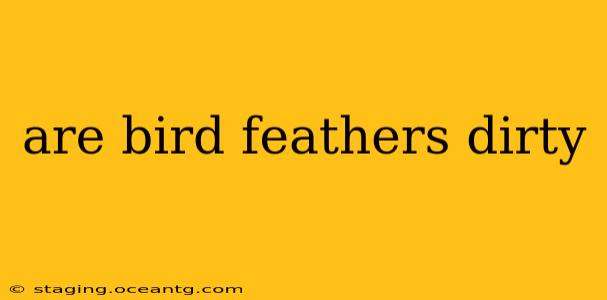Are Bird Feathers Dirty? A Deep Dive into Avian Hygiene
The question, "Are bird feathers dirty?" is deceptively simple. The answer, as with most things in nature, is nuanced. While a bird's feathers might look clean, the reality is more complex, involving a fascinating interplay of hygiene behaviors, environmental factors, and the crucial role feathers play in a bird's survival.
What makes bird feathers appear dirty?
Bird feathers can appear dirty for several reasons, not all of which indicate poor hygiene on the bird's part. Dust, pollen, mud, and other debris from their environment naturally accumulate on feathers. This is especially true for ground-dwelling birds or those inhabiting environments with high levels of particulate matter. Furthermore, certain parasites like mites and lice can contribute to a dull, unkempt appearance. Finally, oil from the bird's preen gland, while essential for feather maintenance, can sometimes appear as a dark smudge, especially if the bird hasn't preened thoroughly.
How do birds keep their feathers clean?
Birds have evolved incredibly sophisticated methods for maintaining feather hygiene. The most common is preening. Birds use their beak to meticulously groom their feathers, removing parasites, distributing oil from their preen gland (which contains waterproofing and antimicrobial substances), and rearranging feathers to maintain their aerodynamic properties. Dust bathing is another important behavior, whereby birds roll in dust or sand to help remove parasites and loosen debris from their feathers. Water bathing, especially for birds living near water sources, is also a vital part of their cleaning routine.
Do birds get sick from dirty feathers?
While feathers aren't inherently "dirty" in a way that directly causes illness, the accumulation of dirt and parasites can indirectly lead to health problems. Parasites can irritate the skin, cause feather damage, and transmit diseases. Excessive dirt can also impede feather function, making it difficult for birds to fly, maintain body temperature, or effectively repel water.
What are some signs of unhealthy feathers?
Several signs suggest a bird might be struggling with feather hygiene or have underlying health issues: matted feathers, missing feathers, a dull and lifeless appearance, excessive dirt or debris, and visible parasites. If you observe these signs in a bird you care for (such as a pet bird), it is important to consult an avian veterinarian.
How often do birds clean their feathers?
The frequency of feather cleaning varies greatly depending on the bird species, its environment, and its overall health. Some birds preen several times a day, while others might only engage in this behavior periodically.
Are all bird feathers equally clean?
No, the cleanliness of a bird's feathers can vary significantly. Birds that live in cleaner environments tend to have cleaner feathers than birds that live in dirtier environments. Furthermore, birds with good health and efficient preening habits tend to maintain cleaner plumage than birds with health issues or parasites.
Can human intervention help?
In most cases, birds are perfectly capable of keeping themselves clean. However, human intervention might be necessary for birds injured, ill, or orphaned. Rehabilitation centers specialize in cleaning and treating the feathers of birds requiring assistance. Under no circumstances should you attempt to clean a wild bird's feathers without appropriate training and expertise.
In conclusion, while the appearance of bird feathers might suggest varying levels of "cleanliness," it's important to understand the complex interplay of natural processes, behaviors, and environmental factors that contribute to their condition. The bird's own meticulous cleaning habits, along with the role of the preen gland, are essential to maintaining healthy and functional plumage.
